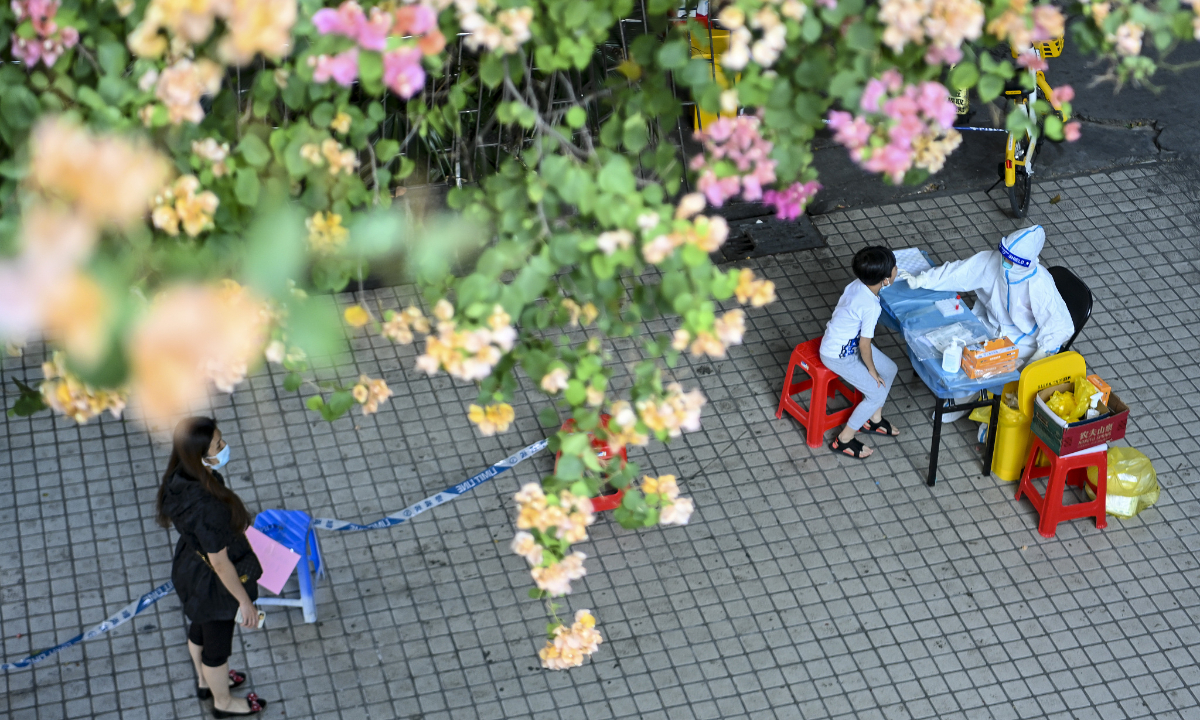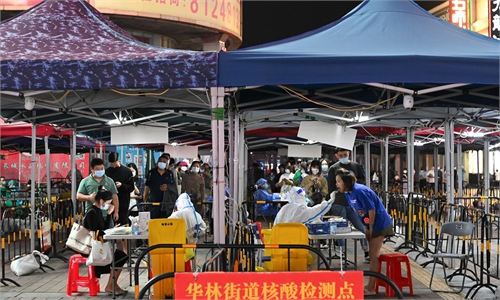Guangdong will allow qualifying close contacts to implement home quarantine: local official

Residents take nucleic acid test of COVID-19 in Guangzhou, South China's Guangdong Province on October 29, 2022. Photo: VCG
A top official in South China's Guangdong Province on Sunday ordered local epidemic prevention and control authorities to carefully identify COVID-19 cases and close contacts, allow qualifying close contacts to implement home quarantine, and lift COVID-19 restrictions in qualified areas in time to minimize the impact of the epidemic on public work and life.On Monday, 8,194 new COVID-19 cases were reported in Guangdong, including 469 confirmed cases and 7,725 asymptomatic cases, according to the Health Commission of Guangdong Province. Based on official statistics, 19 of Guangdong's 21 prefecture-level cities reported new infections on Monday.
During a meeting of the Guangdong working group on COVID-19 prevention and control on Sunday, Wang Weizhong, governor of the province, said the epidemic situation in the province is still grim and complex, and the epidemic prevention and control task remains arduous. Wang said that the epidemic prevention center should adhere to the ninth edition of China's COVID-19 control protocols and focus on the fight against the epidemic in key areas of Guangzhou, capital of Guangdong.
Wang stressed the need to carefully screen infected people and close contacts, and support those who meet the conditions to implement home quarantine. The authorities should take targeted measures to prevent and control the epidemic, identify high-risk areas in a scientific and rapid manner, and unseal qualified areas in time, so as to minimize the impact of the epidemic on public work and life, Wang said.
To implement home quarantine, several basic conditions must be met; for instance, the close contact should live alone, or the house should have a well-ventilated room for the close contact to live in isolation. Also, the close contact should use a separate toilet, and the family should be equipped with a thermometer, tissues, masks, disposable gloves, disinfectants and other personal protection and disinfection products.
According to Caixin News, some residents of Guangzhou have reported that if the close contact is an elderly person or a child with mobility difficulties, and the family has a single room, a separate toilet, sanitation and disinfection items, the community will generally provide special treatment and allow the close contact to be quarantined at home.
During a press conference on epidemic prevention and control on Tuesday, local officials said that in the past two days the number of newly confirmed positive cases in Guangzhou has still been high, and there is a wide range of distribution. The number of new cases in Haizhu district, Tianhe district and Panyu district has developed rapidly.
As of Tuesday, 11 districts across the city had announced a temporary suspension of dining-in at restaurants.
To effectively stop the spread of the epidemic, several areas of the city have made timely and dynamic adjustments to their nucleic acid testing strategies and strengthened prevention and control measures in light of the local epidemic situation, to minimize the flow of people and reduce the risk of epidemic transmission, said Zhang Yi, deputy director and spokesperson for the Guangzhou Municipal Health Commission.
These measures include suggesting that people work from home, adopting flexible working practices to minimize social gathering, and strictly controlling all kinds of large-scale events.
In regions where the epidemic situation is relatively stable, the resumption of production and work is proceeding in an orderly manner. Zhang Yongliang, deputy mayor of Haizhu district, said at the press conference that the district has gradually promoted the resumption of work and production, especially in the Guangdong Artificial Intelligence and Digital Economy Laboratory in Pazhou and other non-controlled areas in eastern Guangzhou.
Among the 28 key buildings in Pazhou that have been put into use, the overall rate of enterprises resuming work has reached 51 percent, with more than 2,000 employees in key enterprises returning to work.
At present, nine manufacturing enterprises have made applications to resume work, Zhang said.
In addition, the Guangzhou Municipal Health Commission issued a notice on Monday, which suggested that those who do not need to go out - including the elderly who tend to stay at home, students who need to take classes on a daily basis, employers working from home and other people who do not have social contact activities - do not have to have nucleic acid screening, to reduce the risk of infection in crowds.
Global Times


